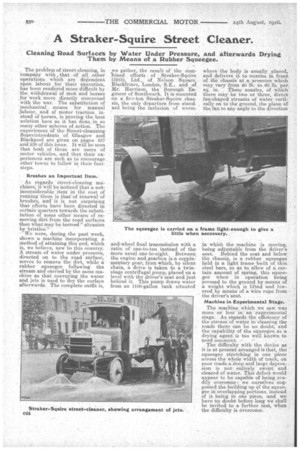A Straker-Squire Street Cleaner.
Page 14

If you've noticed an error in this article please click here to report it so we can fix it.
Cleaning Road 'Surfaces by Water Under Pressure, and afterwards Drying Them by Means of a Rubber Squeegee.
The problem of street cleaning, in company with • that . of all other operations which are detiendent upon labour for their execution, • has been rendered more difficult by the withdrawal of meri and horses for workmore directly concerned with the war. The substitution of mechanical means for manual „labour, and of motor traction instead of horses, is proving the best solution here as it has otone, in so many other spheres of action. The experiences of the Street-cleansing Superintendents of Glasgow and Blackpool aregiven on pages 537 and 538 of this issue. It will be seen that both of these are users of motor vehicles, and that their experiences are such as to encourage other towns to follow in their footsteps.
Brushes an Important Item.
• As regards street-cleaning machines, it will be noticed that a notinconsiderable item in the cost of running these is that-of renewal of brushes, and it is not surprising that efforts have been directed in certain quarters towards the substitution of some other means of removing dirt from the road surfaces than what may be termed." abrasion by bristles." We were, during the past week, shown a machine incorporating a method of attaining this end, which is, we believe, new to this country. A stream AA water under pressure, directed on to the road surface, serves to remove the dirt, while a rubber squeegee following the stream and carried by the same machine as that conveying the water and jets is used to 'dry the surface afterwards. The complete outfit is, we gather, the result of the coin7bined efforts of Straker-Squire -(191:0, Ltd. of Nelson Square, Blaekfriars, 'London, S.E., and of Mr. Harrison, the Borough' Engineer of Southwark. It is mounted on a five-ton 'Straker-Squire chas.sis, the only departure from standard being the inclusion '01 worm7 and-wheel final transmission with a ratio of one-to-ten instead of the more usual one-to-eight. Between, the engine and gearbox ia a supplementary gear, from which, by silent chain, a drive is taken to a twinstage centrifugal pump, placed on a level with the driver's seat and just behind it. This purup draws water from an 1100-gallon tank situated
where the body is usually placed, and delivers it to 'nozzles in front of the chassis at a pressure which may vary from 40 lb. to.60 lb. per
sq. in. These nozzles, of which there may be two or three, direct fan-shaped streams of water vertically on to the ground, the plane of the fan to any angle tothe direction
in which the machine is moving, being adjustable from the driver's seat. Behind the seat and below the chassis, is a rubber squeegee held in a light frame built of thin steel bars, in as to allow of a certain amount of spring, this squeegee when in operation being pressed to the ground by means of • a weight which is lifted and lowered by means of a wire rope from the driver's seat.
Machine in Experimental Stage.
The machine which we saw was more or less in an experimental stage. As regards the efficiency of the stream of water in cleaning the roads there can be no doubt, and the capability of the squeegee as a drying agent is too well known to need comment.
The difficulty with the device as it is at present arranged is that, the squeegee stretching in one piece across the whole width of track, on poor roads a deep and large depression is not entirely swept and cleared of water. This defect would appear to be capable of being readily overcome : we ourselves suggested the building up Of the squeegee in overlapping portions, instead of it being in one piece, and we have no doubt before long we shall be invited to a further test, when the difficulty is overcome.




















